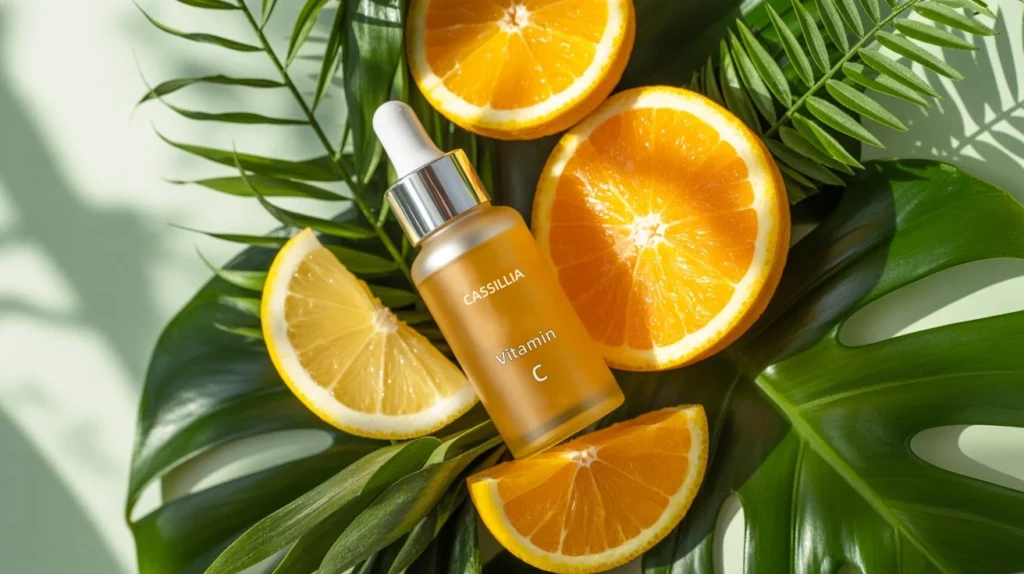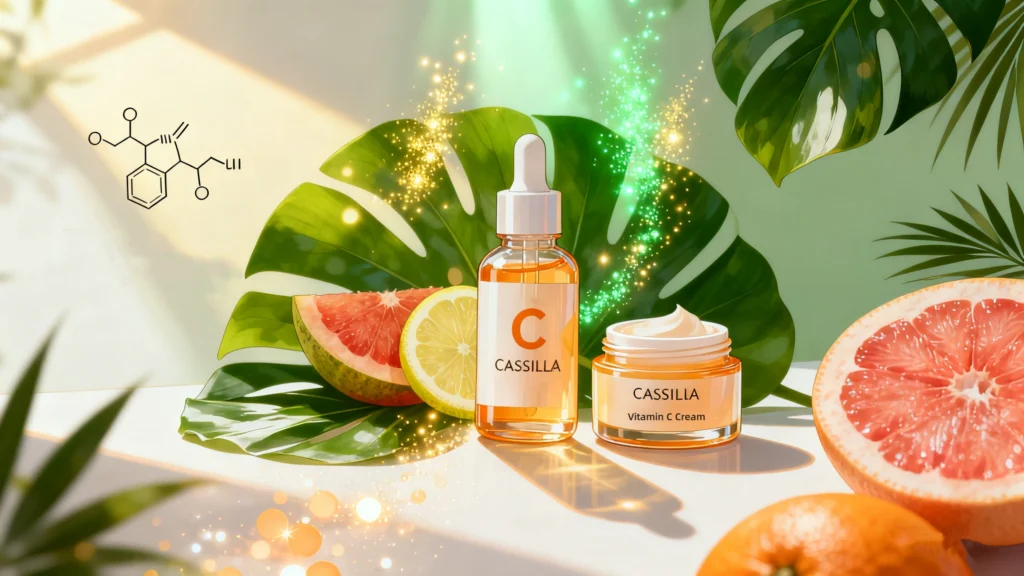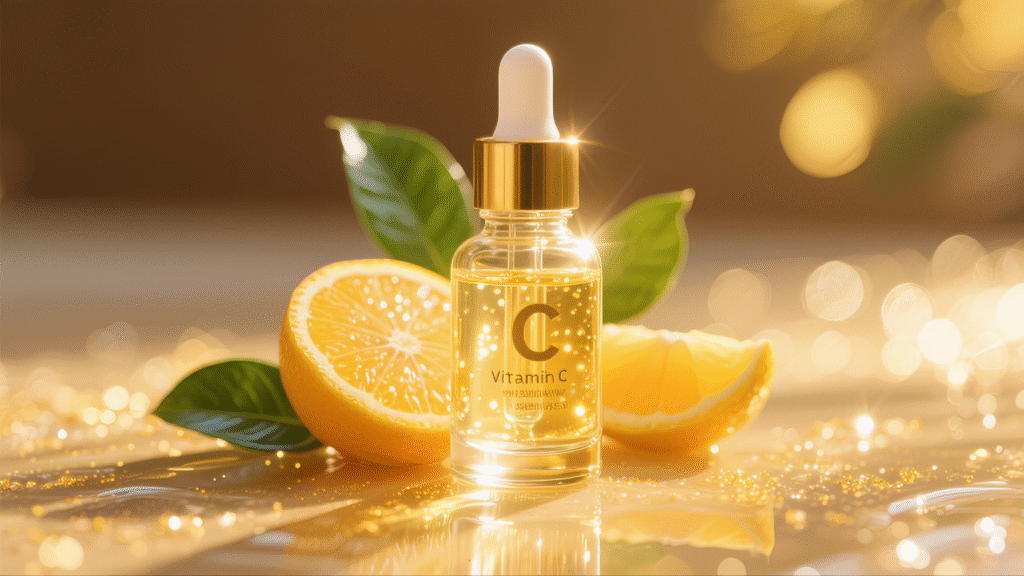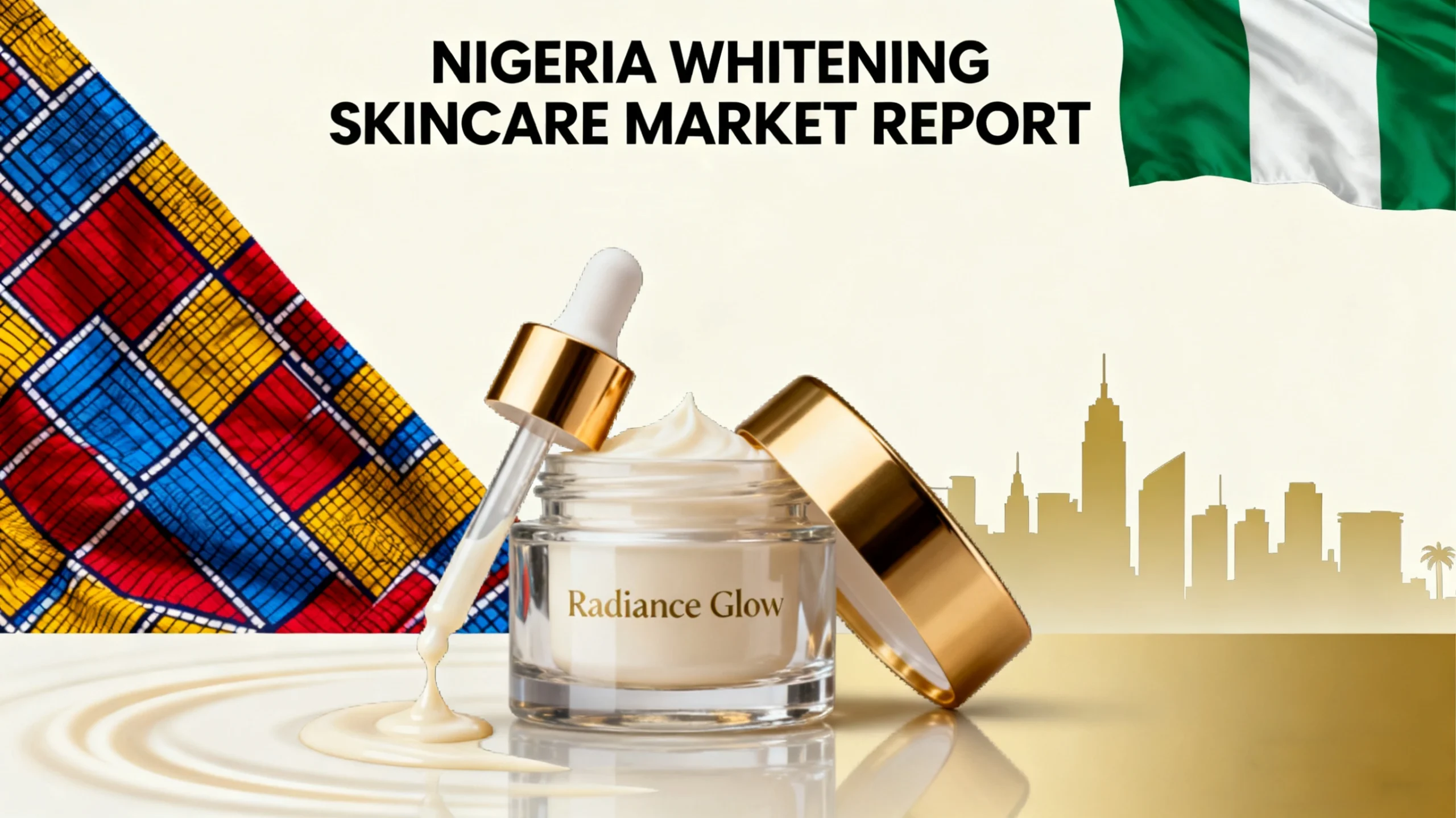Why Vitamin C is Important for Skincare?
Learn its antioxidant power, brightening effect, collagen support, and how to choose and use vitamin C skincare safely.
Vitamin C is widely recognized as one of the most powerful and reliable ingredients in modern skincare formulations. Backed by dermatological research and used by millions worldwide, this ingredient offers visible results for brightening, anti-aging, and environmental protection. At CASSILLIA, we believe truly effective skincare must be both science-based and skin-safe, and vitamin C fits this philosophy perfectly.
In this guide, we will explain why vitamin c is important for skin health, how it works at a cellular level, and how to use it correctly for maximum results.

What Is Vitamin C in Skincare?
Vitamin C—often listed in ingredients as ascorbic acid or ascorbic acid derivatives—is a water-soluble antioxidant essential for skin health. While our body cannot produce vitamin C on its own, topical application can effectively deliver it into the skin, offering targeted skin benefits.
In modern vitamin c skincare, you may find it in different forms:
L-Ascorbic Acid (LAA): Most potent and fast-acting form but unstable
Ascorbyl Glucoside: More stable and skin-friendly
3-O-Ethyl Ascorbic Acid: Highly stable and often found in premium serums
Sodium Ascorbyl Phosphate: Ideal for sensitive and acne-prone skin
Because of these benefits, vitamin c for skin has become a staple ingredient across serums, creams, essences, and brightening treatments.

Powerful Antioxidant Protection: Defense Against Skin Aging
One of the most important biological roles of vitamin c is its strong antioxidant capability. Every day, our skin is exposed to UV radiation, blue light from devices, pollution, and emotional stress. These external factors generate free radicals—unstable molecules that damage skin cells and accelerate aging.
Free radicals destroy:
Collagen and elastin fibers
Cell membranes
DNA structure
This leads to fine lines, wrinkles, sagging, uneven skin tone, and dullness.

How Vitamin C Works as an Antioxidant
Vitamin C acts as a first-line defender by donating electrons to neutralize free radicals. Scientists often describe it as a “sacrificial antioxidant” because it protects skin cells by destroying free radicals before they can cause aging or cell death.
In simple terms:
Vitamin C works like a shield that protects skin from environmental damage—just like wearing an invisible antioxidant armor daily.
This is why dermatologists recommend incorporating vitamin c skincare into your morning routine to help prevent photoaging.

Stimulates Collagen Production for Firm, Youthful Skin
Collagen is the structural protein responsible for firm, smooth, and elastic skin. However, after the age of 25, the body loses collagen at a rate of 1% per year, and external factors like UV exposure speed up this loss.
Vitamin C plays a crucial biochemical role:
It is a cofactor for enzymes called prolyl and lysyl hydroxylase
These enzymes are essential in collagen synthesis
Without vitamin C, collagen production slows dramatically
Clinical studies show that consistent use of vitamin C can:
Reduce fine lines and early wrinkles
Improve skin firmness
Support dermal repair
This makes vitamin c for skin a reliable ingredient in anti-aging formulas.

Brightens Skin Tone and Reduces Dark Spots
Melanin overproduction leads to pigmentation issues such as:
Sun spots
Age spots
Post-acne hyperpigmentation
Uneven skin tone
Vitamin C interrupts melanin production by:
Inhibiting tyrosinase, the enzyme responsible for melanin synthesis
Blocking melanin transfer to skin cells
Reducing already oxidized dark melanin to a lighter form
As a result, it helps:
✅ Fade dark spots
✅ Improve dull complexion
✅ Increase skin clarity and radiance
This is why vitamin C is widely used in brightening and glow-enhancing skincare products, especially in serums.

Enhances Sun Protection – Perfect Daytime Skincare Partner
While vitamin C is not a sunscreen, it is one of the best ingredients to support daily sun protection. Sunscreens act as a physical or chemical shield that blocks or absorbs UV radiation. However, UV rays that are not fully blocked can still generate free radicals inside the skin.
This is where vitamin C comes in:
| Sunscreen Role | Vitamin C Role |
|---|---|
| Blocks UV rays | Neutralizes UV-induced free radicals |
| Prevents sunburn | Prevents oxidative stress |
| Protects skin surface | Protects skin cells from inside |
Using vitamin C serum in the morning followed by sunscreen forms a double defense system against photoaging and hyperpigmentation. For this reason, many dermatologists recommend applying vitamin C in daytime routines.

Anti-Inflammatory and Skin Repair Benefits
In addition to antioxidant and brightening effects, vitamin C also shows anti-inflammatory properties. It helps soothe and repair the skin, making it beneficial for:
Post-acne redness
Irritated or weakened skin barrier
Rosacea-prone skin
Minor skin damage from pollution or sun exposure
It also promotes faster healing due to its role in collagen synthesis and tissue regeneration, making it helpful in reducing the appearance of acne scars and marks.

Visible Results from Consistent Use
By using stable and effective vitamin c skincare products consistently, you can expect visible improvements such as:
✔ Brighter and more radiant skin tone
✔ Reduction in dark spots and acne marks
✔ Improved firmness and elasticity
✔ Healthier, stronger skin barrier
✔ Reduced fine lines and early wrinkles

How to Choose High-Quality Vitamin C Products
Not all Vitamin C formulas are equally effective. Stability, concentration, pH level, and supporting ingredients all determine the real performance.
✅ Choose Stable Forms
Pure L-Ascorbic Acid (LAA) is highly effective but easily oxidizes when exposed to light, heat, or air. For better stability and safety, many brands use modern derivatives:
| Form | Features | Skin Type |
|---|---|---|
| L-Ascorbic Acid | Fast results, potent | Experienced users |
| Ascorbyl Glucoside | Gentle + stable | Sensitive skin |
| 3-O-Ethyl Ascorbic Acid | High absorption | All skin types |
| Sodium Ascorbyl Phosphate | Anti-acne benefit | Oily / acne skin |
✅ Packaging Matters
Vitamin C is sensitive to light and air. Good products usually use:
Dark amber or opaque bottles
Airless pumps or dropper bottles
Individually sealed sachets for freshness
If a Vitamin C serum turns dark orange or brown, it has oxidized — meaning it’s lost most of its effectiveness.

Ideal Concentration and pH Level
Choosing the right strength reduces irritation while maximizing results.
| Skin Experience | Concentration | Recommendation |
|---|---|---|
| Beginner | 5%–10% | Introduce slowly |
| Intermediate | 10%–15% | Brightening + glow |
| Experienced | 15%–20% | Anti-aging care |
For pure L-Ascorbic Acid, acidic pH around 2.8–3.5 ensures optimal penetration.

When and How to Use It Correctly
✔ Best used in the morning to strengthen antioxidant defense
✔ Apply after cleansing and toner
✔ Seal with moisturizer + sunscreen for daytime protection
Routine example:
Cleanser
Toner
Vitamin C Serum
Moisturizer
Sunscreen (SPF 50 recommended)

Who Should Use Vitamin C?
✅ Suitable for:
Dull, tired-looking skin
Dark spots, pigmentation, acne marks
Early aging, fine lines, loss of firmness
Uneven skin tone or rough texture
Office workers exposed to blue light and pollution
⚠ Use with caution if:
You have extremely sensitive skin
You already use strong actives (retinol, AHAs/BHAs)
You have compromised skin barrier
Tip: Start slow — use it every other day first, then increase frequency.

Can You Combine Vitamin C with Other Ingredients?
| Ingredient | Safe to Use Together? | Benefit |
|---|
| Hyaluronic Acid | ✅ Yes | Extra hydration |
| Vitamin E | ✅ Yes | Boosts antioxidant effect |
| Niacinamide | ✅ Yes | Brightening combo |
| Sunscreen | ✅ Perfect | Daytime protection |
| Retinol | ⚠ With care | Use at night, alternate days |
| AHAs/BHAs | ⚠ Possible irritation | Use different days |

FAQ
Q1: Is Vitamin C safe for daily use?
Yes, when used in suitable concentration. Most people can safely use it once daily.
Q2: Can people with oily skin use it?
Absolutely—choose lightweight gel serums or Sodium Ascorbyl Phosphate formulas.
Q3: Can it remove acne scars?
It helps fade pigmentation and supports repair of post-acne marks over time.
Q4: How long does it take to see results?
Brightening can be seen in 2–4 weeks; firming and wrinkle reduction may take 6–8 weeks.
Table of Contents
Related Posts for You

African Sunscreen Market: From Luxury to Necessity
African Sunscreen Market: From Luxury to Necessity Discover how CASSILLIA supports global brands with OEM/ODM sunscreen cream solutions tailored for dark skin and tropical climates.

“GOLDEN” Skin Care Products in the African Market
“GOLDEN” Skin Care Products in the African Market Luxury, Brightening & Natural Care In Africa, “GOLDEN” is more than a color — it symbolizes luxury,

Nigeria Whitening Skincare Products Market
Nigeria Whitening Skincare Products Market Nigeria Whitening & Skincare Products Market: Culture, Safety and Opportunity in the African Skincare Market Cultural Aesthetics & Social Drivers

Chinese Top Skin Care Supplier
Building 8, Huanya Industrial Park, Taiping Town, Conghua District, Guangzhou, China
Tel: +86 13922328503
E-mail: infocassillia@gmail.com
quick links
Products
Why CASSILLIA
- OEM/ODM Customization
- Market-Focused
- Reliable Supply Chain
- Competitive Pricing
- One-Stop Solution
- Global Trade Show Experience
- 23 Years of Manufacturing Expertise


